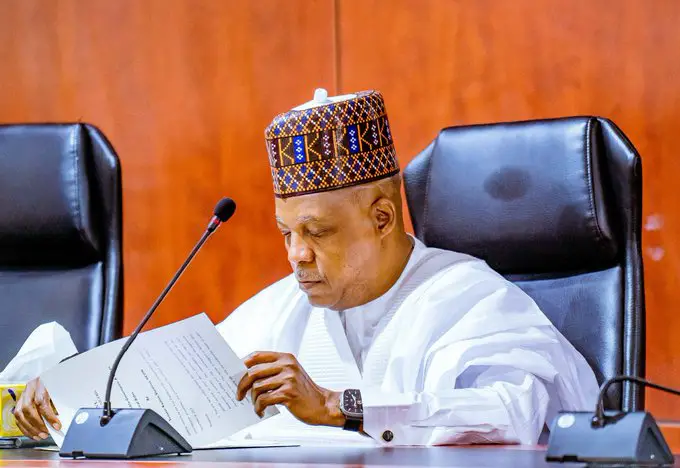Vice President Kashim Shettima has urged a shift from oil dependency to other critical sectors with promising investment opportunities in Nigeria.
He highlighted agriculture, manufacturing, renewable energy, and digital innovation as key areas to explore, aligning with the nation’s development goals outlined in the Economic Recovery and Growth Plan (ERGP).
Speaking at the Existing Foreign Direct Investors Roundtable held at the Banquet Hall of the Presidential Villa in Abuja, Shettima’s media aide, Stanley Nkwocha, relayed that the Vice President emphasized the diverse investment opportunities signaled by President Bola Tinubu’s Renewed Hope administration’s eight-point agenda, ranging from agriculture to renewable energy.
“Through targeted incentives and public-private partnerships, we aim to unlock the full potential of these sectors, catalyzing job creation and socio-economic empowerment across the country,” he added.
Shettima assured the investors and other development partners of a business environment that is characterized by transparency, accountability, and regulatory certainty, even as he implored them to “recognize the indispensable role of public-private partnerships in mobilizing resources, sharing expertise, and mitigating investment risks.”
The VP observed that with the non-oil sector contributing 93.62 per cent to Nigeria’s GDP in the first quarter of 2024, it is imperative to explore other critical sectors of the nation’s economy.
He said, “It is not by chance that the non-oil sector contributed 93.62% to the nation’s GDP in the first quarter of 2024. This significant shift from our oil dependency invites us to explore diverse sectors such as agriculture, manufacturing, renewable energy, and digital innovation.
“These sectors not only promise attractive returns but also align with our national development priorities outlined in the Economic Recovery and Growth Plan (ERGP) and subsequent blueprints.”
Shettima further said the Tinubu administration adopted some mechanisms for the ease of doing business which, according to him, “stimulate investment across critical sectors and strengthen the capacity of public institutions, ensuring that industry stakeholders are never undermined.”
Emphasizing the importance of investment in the life of a country’s economy, Shettima noted that it is not just about financial returns but also “building lasting legacies and making enduring contributions to society,” just as he told the investor that their investments are capable of uplifting “communities, create sustainable livelihoods, and drive inclusive growth.”
He noted: “The life of every economy is defined by the volume of investments it accommodates and attracts. Investments are the lifeblood that fuels innovation, drives growth, and creates opportunities for prosperity.
“Today, as we gather for this roundtable with our esteemed foreign direct investors, we celebrate not just the capital that flows into our nation but the confidence, trust, and partnerships that these investments represent”.
Shettima emphasized that President Tinubu’s visionary leadership and pro-business background further incentivize investing in Nigeria under the current administration.
Earlier, in his welcome address, the Deputy Chief of Staff to the President (Office of the Vice President), Senator Ibrahim Hadejia, commended development partners, foreign investors, and other stakeholders for participating in the meeting.
Senator Hadejia highlighted the efforts made by President Tinubu’s administration to enhance the investment climate in Nigeria. He mentioned that many of these measures are at various stages of implementation and will benefit existing and prospective investors in the coming years.
Princess Zahrah Mustapha-Audu, the Technical Adviser to the President on Foreign Direct Investment (FDI), presented a summary report of a survey that aggregated views on foreign investments in Nigeria. She noted that the findings would be crucial in the Tinubu administration’s efforts to improve the investment environment in the country.
She explained that the ‘Existing Foreign Direct Investors Roundtable’ program focuses on retaining and scaling up investments in Nigeria. The outcome of the discussions at the forum will be used to enhance existing frameworks and policies aimed at encouraging foreign direct investment in Nigeria.
Also present at the roundtable were the Minister of Finance and Coordinating Minister of the Economy, Mr. Wale Edun; Minister of Industry, Trade and Investment, Dr. Doris Uzoka-Anite; Managing Director of the Nigeria Sovereign Investment Authority (NSIA), Mr. Aminu Umar-Sadiq; CEO of Nigeria Investment Promotion Commission (NIPC), Aisha Rimi; Comptroller General of Nigerian Immigration Service (NIS), Kemi Nandap; a representative of the CBN Governor, and representatives of other federal government agencies.
Other participants included the UAE Ambassador to Nigeria, H.E. Salem Saeed AlShamsi, the leadership of the American Business Council, other members of the diplomatic corps, and technical partners.



